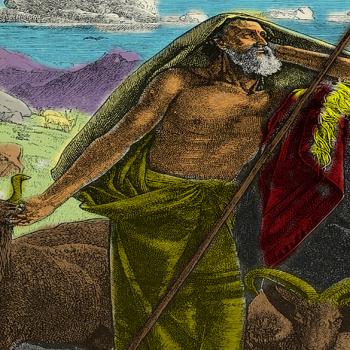Regarding my most recent Fare Forward essay, two questions have been repeatedly asked of me. The first: Why think that symbolic action occupies such an important place in the Christian life? And the second: I’m not sure I understand the sorts of symbolic actions you think are so important to the Christian life; could you say more? I debated which of these two questions to take up today, and settled on the latter. My apologies to those more interested in the former.
Let me begin by trying to draw out the very idea of symbolic action. It can seem a very puzzling and inchoate notion at first glance. But it should appear less so once we realize just how familiar we really are with symbolic action. A referee in a football game throws a yellow flag; he thereby is declaring that a penalty has been committed. A child holds his hand to his chest while reciting his nation’s anthem; he thereby pledges himself to his country. A young man says the words “I do” before an altar; he thereby makes a promise of love and fidelity to another. In each of these familiar instances, someone makes a very tangible, very material action: throwing a yellow flag, holding a hand to his heart, forming an audible English sentence. And in each of these instances we find someone performing a much less tangible and entirely immaterial action by way of performing these “tangible, material actions”: Declaring that a penalty has been committed, pledging allegiance to country, making a promise. These are all symbolic actions, of a kind. A referee throws a yellow flag, a symbol that some penalty is being declared; and because of this symbolism, his action of throwing this flag counts as his declaring a penalty. Symbolic action is not a novel concept to us; it is both familiar and pervasive.
But if symbolic actions are so familiar and pervasive, why my concern that we make symbolic actions a bigger part of our lives? It is not symbolic action, in general, that I wanted to urge as an important component of a well-lived Christian life. Of course symbolic action, in general, is important; we couldn’t imagine life without symbolic action, much less imagine a good life. (Try to make a promise without symbols. Go on, try it.) But what I had my eye was not symbolic actions in general, but on certain sorts of symbolic action. The call to follow Jesus, I wanted to argue, includes the call to practice certain sorts of symbolic actions — above and beyond the usual, unavoidable ones.
Just what sorts of symbolic practices are these? Here I have only the space (and the ability) to gesture in the direction of an answer. And the best way I know to so gesture is by focusing on examples of those “sorts of symbolic actions central to the well-lived Christian life” — two examples to be specific: proclamation and participation. More precisely, proclamation of and participation in the Kingdom of God.
Clearly the business of proclaiming the Kingdom of God is a point of focus in Christian scripture and tradition. Jesus was always on about the Kingdom of God, the apostles were always on about the Kingdom of God, and both Jesus and the apostles were always on about you and I being on about the Kingdom of God. “Go into all the world and proclaim the good news to the whole creation.” One way to proclaim the good news of the Kingdom of God is, of course, to use words. This is no doubt a very important way to proclaim the Kingdom of God – I am using them right now. But we cannot leave the matter there; words are not the only kind of symbol. Jesus’ Sermon on the Mount wasn’t his finest proclamation – that was done on the cross, when he could barely breathe, let alone speak.
“This is what the love of God looks like. This is the love of God — the very cornerstone of the Kingdom.”
The Church is to do more than talk of course. She is also called to “live out” the Kingdom of God, to “participate in” the shalom harmony of the Kingdom of God. To put it yet a third way: to practice the life of the Kingdom in the present. But of course we can only do this to the extent that our environment will allow us; and it is part of the Christian and Jewish story that the world we live in – to include our own selves – is deeply damaged, diseased, dysfunctional – in short, sinful. The Kingdom of God can be tangibly brought into this world only in slivers and shadows; especially in as much as it is up to us.
It is here that symbolic action fills another vital niche. Perhaps an example might help to illustrate. One salient feature of the Kingdom of God is that of “fruitfulness”: In the Kingdom, the prophets and psalmists tell us, the earth will abound with its fruits and everyone will have sufficient access to its fruits. There will be no hungry to feed, no naked to clothe, no homeless to house. There will be “enough”. In the present, the Church does its best to make this a reality; she is called to feed the hungry, to clothe the naked, to house the homeless. But it would be downright silly to think that we have it in our power to wipe material need from this present age. Symbols allow us, for one thing, to cope with this fact. And they allow us to have a reach that goes beyond what we can tangibly effect. I am reminded of the meals I had the honor of enjoying at The Isaiah House, a Catholic Worker house in Santa Ana, California. Every Sunday morning over one hundred folks would gather in a backyard in the barrios of Santa Ana – most of them homeless. Everyone held hands in a large circle, prayed the Lord’s Prayer in Spanish and then in English, and then sat down to eat. From a purely effectual standpoint, these meals were relatively unimportant. One hundred people filled their bellies with maybe 5% of their weekly caloric need, and for just a few hours, no one was being stabbed or molested. But it was clear during those few hours, as folks from every race, culture, and economic status imaginable sat down to eat together and laugh together, that these meals were very important. I can’t point to all of where the importance of these meals lay, but I know this at least: These meals held value as symbolic representations of, and symbolic participations in, the “fruitfulness” of the Kingdom of God.
Symbolic proclamation and participation — two important types of symbolic action that belong to the mission of the Church and the life of the follower of Jesus. Let us not think that these sorts of symbolic action belong to the periphery of our lives. Let us not reserve them for heroic occasions like martyrdom, or for Sunday morning services, or for what gets labeled “ministry”. Significant symbolic actions are to belong to our daily rhythms, to be a part of our every hour. How we work, how we do meals, how we talk, even how we build our homes — these all can (and should) be deeply impacted by symbols of the sort I have feebly attempted to describe.















